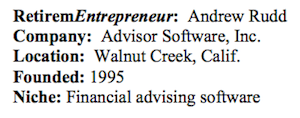
RetiremEntrepreneur: Andrew Rudd
Andrew Rudd, the co-founder of Barra, Inc. (now the MSCI Barra suite of portfolio analysis tools) started Advisor Software Inc. in 1995 to adapt Barra technology for adviser use. "I was always interested in creating products," says the British-born Californian..


